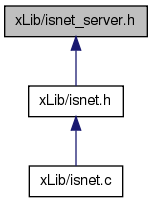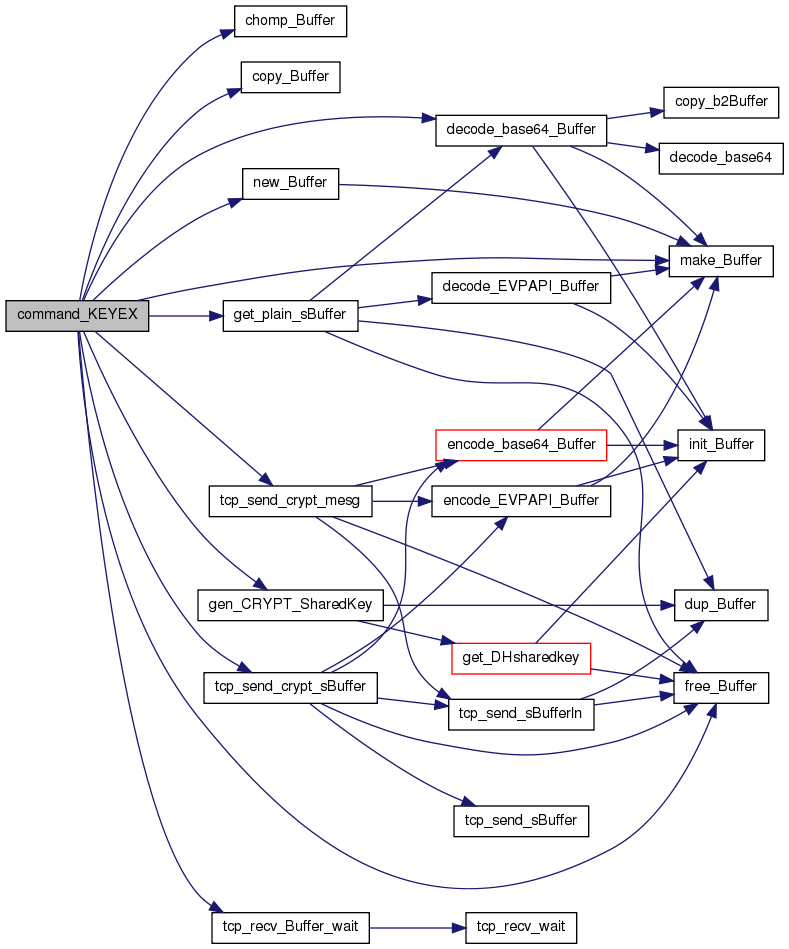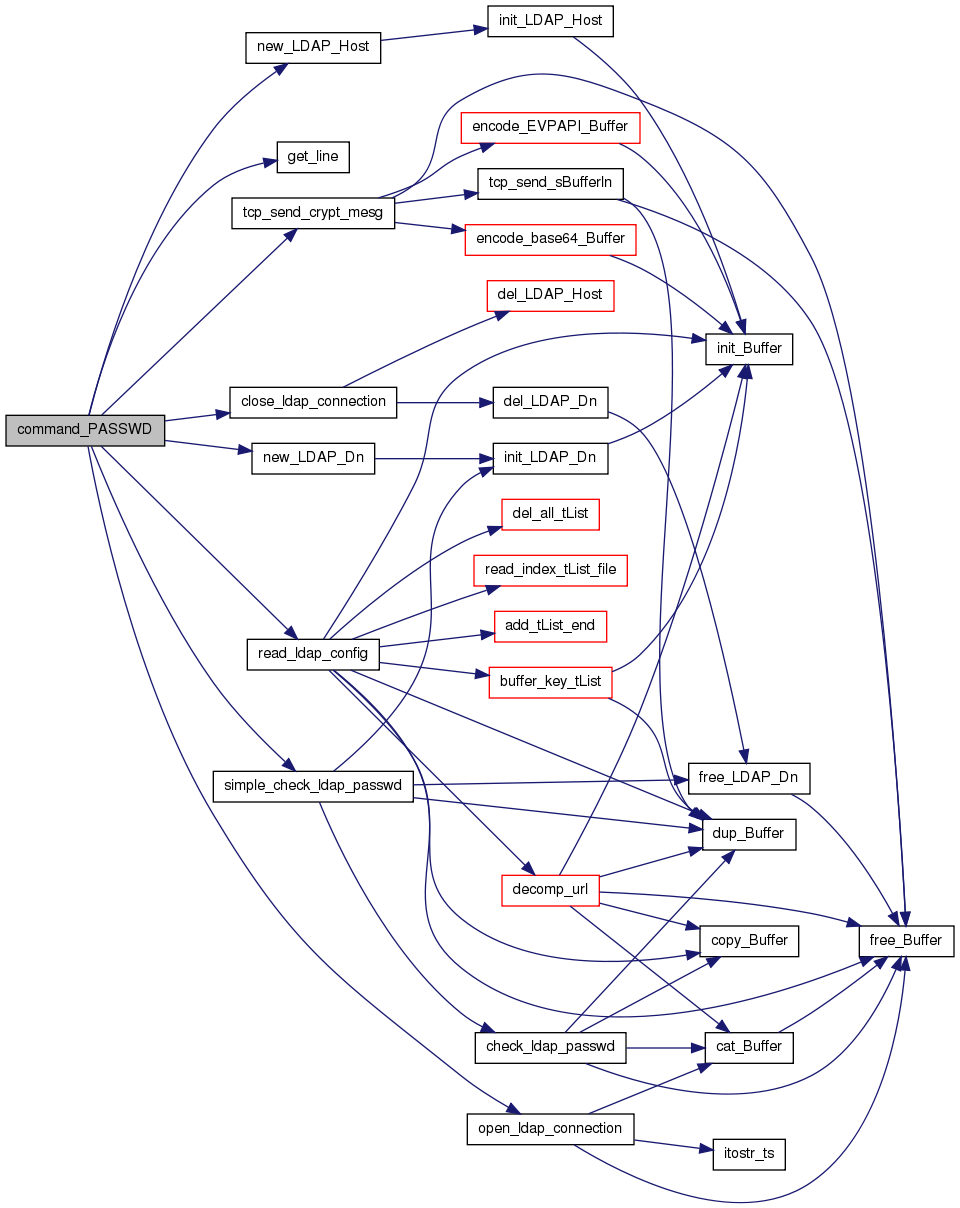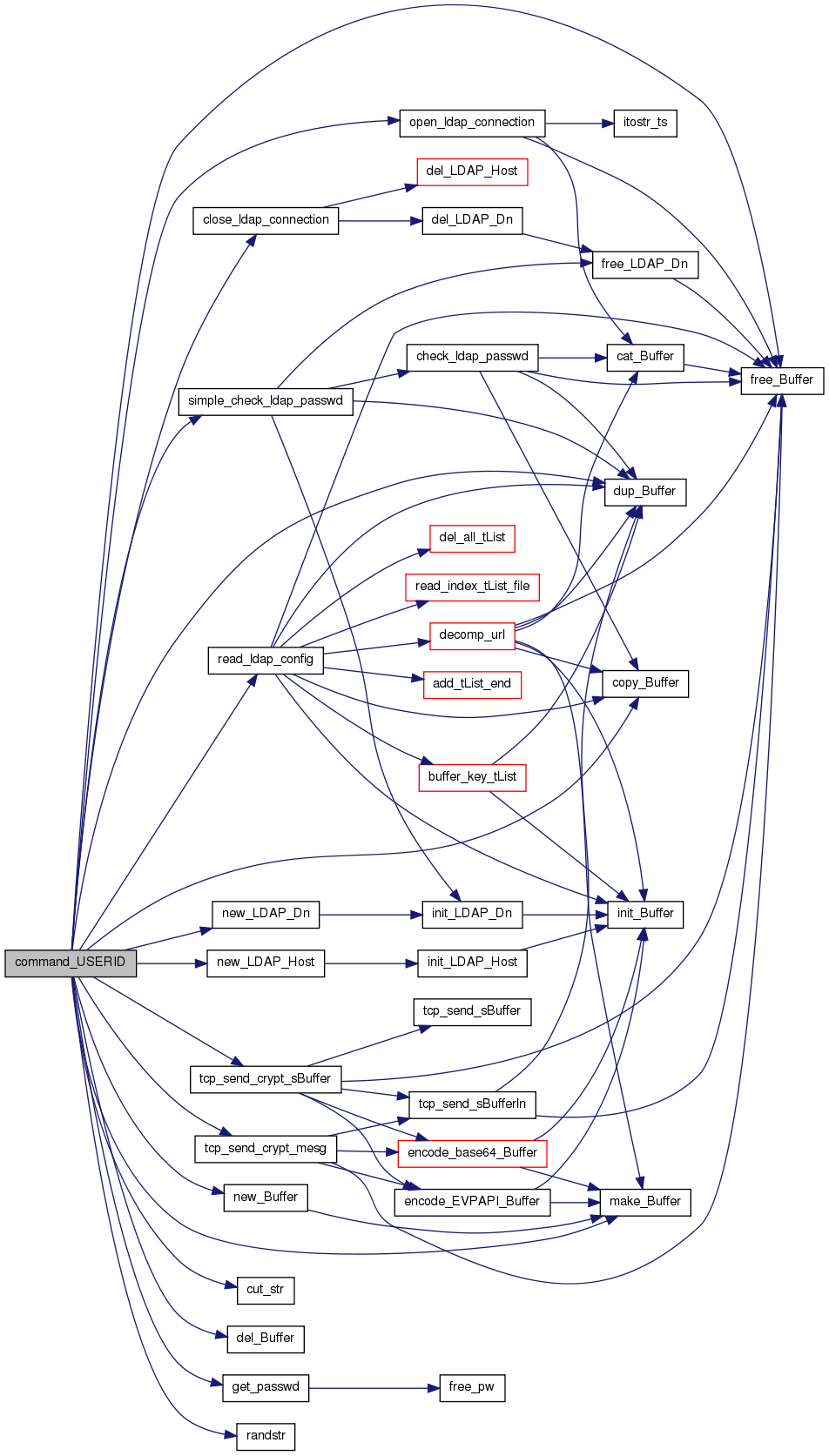xLib/isnet_server.h File Reference

Go to the source code of this file.
Functions | |
| int | command_HELLO (Buffer operand, Buffer comment, int sock) |
| int | command_BYE (Buffer operand, Buffer comment, int sock) |
| int | command_USERID (Buffer operand, Buffer comment, int sock) |
| int | command_PASSWD (Buffer operand, Buffer comment, int sock) |
| int | command_NOCHLNG (Buffer operand, Buffer comment, int sock) |
| int | command_KEYEX (Buffer operand, Buffer comment, int sock) |
| int | command_CRYPT (Buffer operand, Buffer comment, int sock) |
Variables | |
| Buffer * | Base64_DHspki |
| Buffer * | Base64_RSAspki |
| EVP_CIPHER * | CRYPT_Type |
| Buffer * | CRYPT_SharedKey |
| DH * | DHkey |
| Buffer * | User_ID |
| Buffer * | User_Passwd |
| Buffer * | User_Salt |
| int | No_isNet_Chlng |
| int | Use_isNet_Ldap |
| int | Use_isNet_Crypt |
Function Documentation
int command_BYE(Buffer operand, Buffer comment, int sock)
BYEコマンドを処理する.サーバ側処理.
- Parameters:
-
operand コマンドのオペランド comment コマンドのコメント sock クライアントへのソケット
- Return values:
-
0 成功 0以外 エラー番号
- エラー番号
- 110 - 119
Definition at line 318 of file isnet_server.c.
References CRYPT_Type, tcp_send_crypt_mesg(), and UNUSED.
00319 { 00320 int cc; 00321 00322 UNUSED(operand); 00323 UNUSED(comment); 00324 // 00325 cc = tcp_send_crypt_mesg(sock, (char*)"OK\r\n", CRYPT_SharedKey, CRYPT_Type); 00326 //clear_CRYPT_parameter(); 00327 return cc; 00328 }

int command_CRYPT(Buffer operand, Buffer comment, int sock)
CRYPTコマンドを処理する.サーバ側処理.
暗号化方法を変えた場合は,この関数の終了(OK返答)直後から新しい手法に変わる.
- Parameters:
-
operand コマンドのオペランド comment コマンドのコメント sock クライアントへのソケット
- Return values:
-
0 成功 0以外 エラー番号
- エラー番号
- 170 - 179
Definition at line 488 of file isnet_server.c.
References Buffer::buf, CRYPT_Type, DEBUG_MODE, init_EVPAPI_Buffer(), PRINT_MESG, SSL_3DES3CBC, SSL_AES128CBC, tcp_send_crypt_mesg(), and UNUSED.
00489 { 00490 UNUSED(comment); 00491 00492 if (CRYPT_SharedKey==NULL) { 00493 tcp_send_crypt_mesg(sock, (char*)"ERR 171 No Shared Key.\r\n", NULL, NULL); 00494 DEBUG_MODE PRINT_MESG("ERR 171 No Shared Key.\n"); 00495 return 171; 00496 } 00497 00498 if (!strcmp("AES128CBC", (const char*)operand.buf)) { // AES 128bit CBC 00499 tcp_send_crypt_mesg(sock, (char*)"OK\r\n", CRYPT_SharedKey, CRYPT_Type); 00500 free(CRYPT_Type); 00501 CRYPT_Type = init_EVPAPI_Buffer(SSL_AES128CBC); 00502 } 00503 else if (!strcmp("3DES3CBC", (const char*)operand.buf)) { // 3DES 3key CBC 00504 tcp_send_crypt_mesg(sock, (char*)"OK\r\n", CRYPT_SharedKey, CRYPT_Type); 00505 CRYPT_Type = init_EVPAPI_Buffer(SSL_3DES3CBC); 00506 } 00507 else if (!strcmp("RESET", (const char*)operand.buf)) { // RESET: 暗号化中止 00508 tcp_send_crypt_mesg(sock, (char*)"OK\r\n", CRYPT_SharedKey, CRYPT_Type); 00509 //free_EVPAPI_Buffer(); 00510 } 00511 else { 00512 tcp_send_crypt_mesg(sock, (char*)"ERR 179 Unkown CRYPT operand.\r\n", CRYPT_SharedKey, CRYPT_Type); 00513 DEBUG_MODE PRINT_MESG("ERR 179 Unkown CRYPT operand.\n"); 00514 return 179; 00515 } 00516 00517 return 0; 00518 }

int command_HELLO(Buffer operand, Buffer comment, int sock)
HELLOコマンドを処理する.サーバ側処理.
- Parameters:
-
operand コマンドのオペランド comment コマンドのコメント sock クライアントへのソケット
- Return values:
-
0 成功 0以外 エラー番号
- エラー番号
- 100 - 109
Definition at line 290 of file isnet_server.c.
References CRYPT_Type, tcp_send_crypt_mesg(), and UNUSED.
00291 { 00292 int cc; 00293 00294 UNUSED(operand); 00295 UNUSED(comment); 00296 // 00297 cc = tcp_send_crypt_mesg(sock, (char*)"OK\r\n", CRYPT_SharedKey, CRYPT_Type); 00298 return cc; 00299 }

int command_KEYEX(Buffer operand, Buffer comment, int sock)
KEYEXコマンドを処理する.サーバ側処理.
パスワード(及びその他の情報)の交換方法を指定する. オペランドに公開鍵暗号のアルゴリズムが指定されたときに転送するサーバ側の SPKI は外部で 計算済みでなければならない(主にコマンド起動時).
鍵交換アルゴリズムの指定の後,KEYEX SKPI が正常に処理されると,この関数は共有鍵を生成する. 生成された共有鍵は デフォルト共有鍵となる.
- Parameters:
-
operand DH: パスワード情報を暗号化するための,暗号化鍵の交換アルゴリズムとして Diffie-Hellman を指定する.サーバは続いて,自己のSPKIとして Diffie-Hellnan の SPKI(Base64_DHspki) をクラインとに転送する. operand RSA: 鍵交換アルゴリズムに RSA を設定し,サーバはSPKIとして RSAの SPKI(Base64_RSAspki) をクライアントに転送する.(多分 ssl_tool.c 中でまだ実装されていない) operand SPKI: クライアントは,続いて自己のSPKIをサーバへ転送する.サーバはそれを受け取り, 直前に指定された鍵交換のアルゴリズムに従って,共有鍵を生成する. operand CHLNG: パスワードの交換にチャレンジキーを使用する.デフォルト. operand NOCHLNG: パスワードの交換にチャレンジキーを使用しない.この場合は必ず鍵交換 アルゴリズムを指定して暗号化鍵を交換し,通信を暗号化しなければならない. comment コマンドのコメント sock クライアントへのソケット
- Return values:
-
0 成功 0以外 エラー番号
- エラー番号
- 160 - 169
- See also:
- get_CRYPT_SharedKey(), exchange_CRYPT_SharedKey()
Definition at line 365 of file isnet_server.c.
References Buffer::buf, cat_s2Buffer, chomp_Buffer(), copy_Buffer(), CRYPT_Type, DEBUG_MODE, decode_base64_Buffer(), DHkey, FALSE, free_Buffer(), gen_CRYPT_SharedKey(), get_plain_sBuffer(), LBUF, make_Buffer(), new_Buffer(), No_isNet_Chlng, PRINT_MESG, SSL_DH, SSL_RSA, tcp_recv_Buffer_wait(), tcp_send_crypt_mesg(), tcp_send_crypt_sBuffer(), TRUE, UNUSED, Use_isNet_Crypt, and Use_isNet_Ldap.
00366 { 00367 static int keyex; 00368 Buffer buf; 00369 00370 UNUSED(comment); 00371 00372 if (!strcmp("DH", (const char*)operand.buf)) { 00373 if (Base64_DHspki!=NULL) { 00374 Use_isNet_Crypt = TRUE; 00375 keyex = SSL_DH; 00376 tcp_send_crypt_mesg(sock, (char*)"OK\r\n", CRYPT_SharedKey, CRYPT_Type); 00377 00378 buf = make_Buffer(LBUF); 00379 copy_Buffer(Base64_DHspki, &buf); 00380 cat_s2Buffer("\r\nEND\r\n", &buf); 00381 tcp_send_crypt_sBuffer(sock, &buf, CRYPT_SharedKey, CRYPT_Type); 00382 free_Buffer(&buf); 00383 } 00384 else { 00385 tcp_send_crypt_mesg(sock, (char*)"ERR 161 KEYEX DH Error.\r\n", CRYPT_SharedKey, CRYPT_Type); 00386 DEBUG_MODE PRINT_MESG("ERR 161 KEYEX DH Error.\n"); 00387 return 161; 00388 } 00389 } 00390 00391 else if (!strcmp("RSA", (const char*)operand.buf)) { 00392 if (Base64_RSAspki!=NULL) { 00393 Use_isNet_Crypt = TRUE; 00394 keyex = SSL_RSA; 00395 00396 tcp_send_crypt_mesg(sock, (char*)"OK\r\n", CRYPT_SharedKey, CRYPT_Type); 00397 buf = make_Buffer(LBUF); 00398 copy_Buffer(Base64_RSAspki, &buf); 00399 cat_s2Buffer("\r\nEND\r\n", &buf); 00400 tcp_send_crypt_sBuffer(sock, &buf, CRYPT_SharedKey, CRYPT_Type); 00401 free_Buffer(&buf); 00402 } 00403 else { 00404 tcp_send_crypt_mesg(sock, (char*)"ERR 162 KEYEX RSA Error.\r\n", CRYPT_SharedKey, CRYPT_Type); 00405 DEBUG_MODE PRINT_MESG("ERR 162 KEYEX RSA Error.\n"); 00406 return 162; 00407 } 00408 } 00409 00410 else if (!strcmp("SPKI", (const char*)operand.buf)) { 00411 Buffer dkey; 00412 00413 tcp_send_crypt_mesg(sock, (char*)"OK\r\n", CRYPT_SharedKey, CRYPT_Type); 00414 buf = make_Buffer(LBUF); 00415 tcp_recv_Buffer_wait(sock, &buf, 20); 00416 dkey = get_plain_sBuffer(buf, CRYPT_SharedKey, CRYPT_Type); 00417 free_Buffer(&buf); 00418 chomp_Buffer(&dkey); 00419 buf = decode_base64_Buffer(dkey); 00420 free_Buffer(&dkey); 00421 00422 if (CRYPT_SharedKey!=NULL) free_Buffer(CRYPT_SharedKey); 00423 CRYPT_SharedKey = new_Buffer(0); 00424 00425 if (gen_CRYPT_SharedKey(keyex, buf, CRYPT_SharedKey, (void*)DHkey)) { 00426 tcp_send_crypt_mesg(sock, (char*)"OK\r\n", CRYPT_SharedKey, CRYPT_Type); 00427 } 00428 else { 00429 tcp_send_crypt_mesg(sock, (char*)"ERR 163 cannot generate Shared KEY.\r\n", CRYPT_SharedKey, CRYPT_Type); 00430 DEBUG_MODE PRINT_MESG("ERR 163 cannot generate Shared KEY.\n"); 00431 return 163; 00432 } 00433 free_Buffer(&buf); 00434 } 00435 00436 else if (!strcmp("CHLNG", (const char*)operand.buf)) { 00437 if (!Use_isNet_Ldap) { 00438 No_isNet_Chlng = FALSE; 00439 tcp_send_crypt_mesg(sock, (char*)"OK\r\n", CRYPT_SharedKey, CRYPT_Type); 00440 } 00441 else { 00442 tcp_send_crypt_mesg(sock, (char*)"ERR 164 cannot use Challenge Key mode with LDAP mode.\r\n", CRYPT_SharedKey, CRYPT_Type); 00443 DEBUG_MODE PRINT_MESG("ERR 164 cannot use Challenge Key mode with LDAP mode.\n"); 00444 return 164; 00445 } 00446 } 00447 00448 else if (!strcmp("NOCHLNG", (const char*)operand.buf)) { 00449 if (Use_isNet_Crypt==TRUE) { 00450 No_isNet_Chlng = TRUE; 00451 tcp_send_crypt_mesg(sock, (char*)"OK\r\n", CRYPT_SharedKey, CRYPT_Type); 00452 } 00453 else { 00454 tcp_send_crypt_mesg(sock, (char*)"ERR 165 both No Challenge Key mode and No Crypt mode are not used.\r\n", CRYPT_SharedKey, CRYPT_Type); 00455 DEBUG_MODE PRINT_MESG("ERR 165 both No Challenge Key mode and No Crypt mode are not used.\n"); 00456 return 165; 00457 } 00458 } 00459 00460 else { 00461 tcp_send_crypt_mesg(sock, (char*)"ERR 169 Unkown KEYEX operand.\n\r", CRYPT_SharedKey, CRYPT_Type); 00462 DEBUG_MODE PRINT_MESG("ERR 169 Unkown KEYEX operand.\r"); 00463 return 169; 00464 } 00465 00466 return 0; 00467 }

int command_PASSWD(Buffer operand, Buffer comment, int sock)
PASSWDコマンドを処理する.サーバ側処理.
- Parameters:
-
operand コマンドのオペランド comment コマンドのコメント sock クライアントへのソケット
- Return values:
-
0 成功 0以外 エラー番号
- エラー番号
- 130 - 139
Definition at line 189 of file isnet_server.c.
References Buffer::buf, close_ldap_connection(), CRYPT_Type, DEBUG_MODE, FALSE, get_line(), LdapBind, LdapHost, LEN_DESPASS, LEN_DOLLAR5_SALT, LEN_DOLLAR6_SALT, LEN_DOLLAR_SALT, new_LDAP_Dn(), new_LDAP_Host(), No_isNet_Chlng, open_ldap_connection(), PRINT_MESG, read_ldap_config(), simple_check_ldap_passwd(), tcp_send_crypt_mesg(), UNUSED, and Use_isNet_Ldap.
00190 { 00191 char* opass = NULL; // Password that from system 00192 char* npass = NULL; // Password that crypted opass 00193 char* salt = NULL; 00194 00195 UNUSED(comment); 00196 00197 if (User_Passwd==NULL) { 00198 tcp_send_crypt_mesg(sock, (char*)"ERR 131 system has not a your password.\r\n", CRYPT_SharedKey, CRYPT_Type); 00199 DEBUG_MODE PRINT_MESG("ERR 131 system has not a your password.\n"); 00200 return 131; 00201 } 00202 00203 #ifdef ENABLE_LDAP 00204 int cc; 00205 if (!strcmp((const char*)User_Passwd->buf, "*") && Use_isNet_Ldap) { 00206 LdapHost = new_LDAP_Host(); 00207 LdapBind = new_LDAP_Dn(); 00208 read_ldap_config(NULL, LdapHost, LdapBind); 00209 LDAP* ld = open_ldap_connection(LdapHost, LdapBind); 00210 cc = simple_check_ldap_passwd(ld, (char*)User_ID->buf, (char*)operand.buf, LdapBind); 00211 close_ldap_connection(ld, &LdapHost, &LdapBind); 00212 // 00213 if (cc==0) { 00214 cc = tcp_send_crypt_mesg(sock, (char*)"OK\r\n", CRYPT_SharedKey, CRYPT_Type); 00215 return 0; 00216 } 00217 else { 00218 cc = tcp_send_crypt_mesg(sock, (char*)"ERR 138 PASSWD error.\r\n", CRYPT_SharedKey, CRYPT_Type); 00219 DEBUG_MODE PRINT_MESG("ERR 138 PASSWD error.\n"); 00220 return 138; 00221 } 00222 } 00223 #endif 00224 00225 int lsalt = 0; 00226 if (User_Passwd->buf[0]=='$') { 00227 if (User_Passwd->buf[1]=='1') lsalt = LEN_DOLLAR_SALT; 00228 //else if (User_Passwd->buf[1]=='2') lsalt = LEN_DOLLAR2_SALT; 00229 else if (User_Passwd->buf[1]=='5') lsalt = LEN_DOLLAR5_SALT; 00230 else if (User_Passwd->buf[1]=='6') lsalt = LEN_DOLLAR6_SALT; 00231 00232 opass = (char*)&(User_Passwd->buf[lsalt]); 00233 } 00234 else if (strlen((const char*)User_Passwd->buf)==LEN_DESPASS) { 00235 lsalt = 2; 00236 opass = (char*)&(User_Passwd->buf[lsalt]); 00237 } 00238 00239 // 00240 if (No_isNet_Chlng==FALSE) { // Use Challenge Keys 00241 salt = get_line((char*)User_Salt->buf, 2); 00242 if (salt!=NULL && opass!=NULL) { 00243 npass = (char*)crypt((const char*)opass, (const char*)salt); 00244 npass = &(npass[lsalt]); 00245 } 00246 if (npass!=NULL) { 00247 if (!strcmp((const char*)operand.buf, (const char*)npass)) { 00248 tcp_send_crypt_mesg(sock, (char*)"OK\r\n", CRYPT_SharedKey, CRYPT_Type); 00249 return 0; 00250 } 00251 } 00252 } 00253 else { // Not Use Challenge Keys 00254 salt = get_line((char*)User_Salt->buf, 1); 00255 if (salt!=NULL && operand.buf!=NULL) { 00256 npass = (char*)crypt((const char*)operand.buf, (const char*)salt); 00257 npass = &(npass[lsalt]); 00258 free(salt); 00259 } 00260 if (npass!=NULL && opass!=NULL) { 00261 if (!strcmp((const char*)opass, (const char*)npass)) { 00262 tcp_send_crypt_mesg(sock, (char*)"OK\r\n", CRYPT_SharedKey, CRYPT_Type); 00263 return 0; 00264 } 00265 } 00266 } 00267 00268 tcp_send_crypt_mesg(sock, (char*)"ERR 139 PASSWD error.\r\n", CRYPT_SharedKey, CRYPT_Type); 00269 DEBUG_MODE PRINT_MESG("ERR 139 PASSWD error.\n"); 00270 return 139; 00271 }

int command_USERID(Buffer operand, Buffer comment, int sock)
USERIDコマンドを処理する.サーバ側処理.
チャレンジコードを要求しない場合,パスワードが生で流れる可能性があるので,必ず暗号化すること.
- Parameters:
-
operand コマンドのオペランド comment コマンドのコメント sock クライアントへのソケット
- Return values:
-
0 成功 0以外 エラー番号
- エラー番号
- 120 - 129
Definition at line 46 of file isnet_server.c.
References Buffer::buf, cat_s2Buffer, close_ldap_connection(), copy_Buffer(), copy_s2Buffer, CRYPT_Type, cut_str(), DEBUG_MODE, del_Buffer(), dup_Buffer(), FALSE, free_Buffer(), freeNull, get_passwd(), LBUF, LdapBind, LdapHost, LEN_DESPASS, LEN_DESSALT, LEN_DOLLAR5_SALT, LEN_DOLLAR6_SALT, LEN_DOLLAR_SALT, make_Buffer(), make_Buffer_bystr, new_Buffer(), new_LDAP_Dn(), new_LDAP_Host(), No_isNet_Chlng, open_ldap_connection(), PRINT_MESG, randstr(), read_ldap_config(), simple_check_ldap_passwd(), tcp_send_crypt_mesg(), tcp_send_crypt_sBuffer(), TRUE, UNUSED, Use_isNet_Crypt, and Use_isNet_Ldap.
00047 { 00048 char* pass = NULL; 00049 char* salt0 = NULL; 00050 char* salt1 = NULL; 00051 char* salt2 = NULL; 00052 Buffer buf; 00053 00054 UNUSED(comment); 00055 00056 pass = get_passwd((char*)operand.buf); 00057 if (pass==NULL) { 00058 tcp_send_crypt_mesg(sock, (char*)"ERR 121 passwd get error.\r\n", CRYPT_SharedKey, CRYPT_Type); 00059 DEBUG_MODE PRINT_MESG("ERR 121 passwd get error.\n"); 00060 return 121; 00061 } 00062 00063 if (No_isNet_Chlng==TRUE && Use_isNet_Crypt==FALSE) { 00064 tcp_send_crypt_mesg(sock, (char*)"ERR 122 both No Challenge Key mode and No Crypt mode are not used.\r\n", CRYPT_SharedKey, CRYPT_Type); 00065 DEBUG_MODE PRINT_MESG("ERR 122 both No Challenge Key mode and No Crypt mode are not used.\n"); 00066 return 122; 00067 } 00068 00069 if (No_isNet_Chlng==FALSE && Use_isNet_Ldap==TRUE) { 00070 tcp_send_crypt_mesg(sock, (char*)"ERR 123 both Challenge Key mode and Ldap mode are not used.\r\n", CRYPT_SharedKey, CRYPT_Type); 00071 DEBUG_MODE PRINT_MESG("ERR 123 both Challenge Key mode and Ldap mode are not used.\n"); 00072 return 123; 00073 } 00074 00075 if (User_ID!=NULL) del_Buffer(&User_ID); 00076 if (User_Passwd!=NULL) del_Buffer(&User_Passwd); 00077 if (User_Salt!=NULL) del_Buffer(&User_Salt); 00078 User_ID = new_Buffer(0); 00079 User_Passwd = new_Buffer(0); 00080 User_Salt = new_Buffer(0); 00081 *User_ID = dup_Buffer(operand); 00082 *User_Passwd = make_Buffer_bystr(pass); 00083 00084 // 00085 if (strlen(pass)<=2) { 00086 #ifdef ENABLE_LDAP 00087 int cc; 00088 if (!strcmp((const char*)User_Passwd->buf, "*") && Use_isNet_Ldap) { 00089 LdapHost = new_LDAP_Host(); 00090 LdapBind = new_LDAP_Dn(); 00091 read_ldap_config(NULL, LdapHost, LdapBind); 00092 LDAP* ld = open_ldap_connection(LdapHost, LdapBind); 00093 // 00094 if (ld!=NULL) { 00095 cc = simple_check_ldap_passwd(ld, (char*)User_ID->buf, NULL, LdapBind); 00096 close_ldap_connection(ld, &LdapHost, &LdapBind); 00097 if (cc==1) { 00098 cc = tcp_send_crypt_mesg(sock, (char*)"OK\r\n", CRYPT_SharedKey, CRYPT_Type); 00099 return 0; 00100 } 00101 else { 00102 cc = tcp_send_crypt_mesg(sock, (char*)"ERR 128 USERID error with LDAP.\r\n", CRYPT_SharedKey, CRYPT_Type); 00103 DEBUG_MODE PRINT_MESG("ERR 128 USERID error with LDAP.\n"); 00104 return 128; 00105 } 00106 } 00107 else { 00108 cc = tcp_send_crypt_mesg(sock, (char*)"ERR 127 USERID connection error with LDAP.\r\n", CRYPT_SharedKey, CRYPT_Type); 00109 DEBUG_MODE PRINT_MESG("ERR 127 USERID connection error with LDAP.\n"); 00110 return 127; 00111 } 00112 } 00113 #endif 00114 tcp_send_crypt_mesg(sock, (char*)"OK\r\n", CRYPT_SharedKey, CRYPT_Type); 00115 return 0; 00116 } 00117 00118 // 00119 if (pass[0]=='$') { 00120 int lsalt = 0; 00121 if (pass[1]=='1') lsalt = LEN_DOLLAR_SALT; 00122 //else if (pass[1]=='2') lsalt = LEN_DOLLAR2_SALT; // Blowfish 未対応 00123 else if (pass[1]=='5') lsalt = LEN_DOLLAR5_SALT; 00124 else if (pass[1]=='6') lsalt = LEN_DOLLAR6_SALT; 00125 00126 if (lsalt!=0) { 00127 *User_Salt = make_Buffer(lsalt*2 + 5); // \r\n \r\n \0 で +5文字 00128 salt0 = cut_str(pass, 0, 2); 00129 salt1 = cut_str(pass, 0, lsalt-1); 00130 salt2 = randstr(lsalt-4); 00131 copy_s2Buffer(salt1, User_Salt); 00132 cat_s2Buffer("\r\n", User_Salt); 00133 cat_s2Buffer(salt0, User_Salt); 00134 cat_s2Buffer(salt2, User_Salt); 00135 cat_s2Buffer("$", User_Salt); 00136 } 00137 } 00138 // DES 00139 else if (strlen((const char*)pass)==LEN_DESPASS) { 00140 *User_Salt = make_Buffer(LEN_DESSALT*2 + 5); 00141 salt1 = cut_str(pass, 0, LEN_DESSALT-1); 00142 salt2 = randstr(LEN_DESSALT); 00143 copy_s2Buffer(salt1, User_Salt); 00144 cat_s2Buffer ("\r\n", User_Salt); 00145 cat_s2Buffer (salt2, User_Salt); 00146 } 00147 00148 freeNull(pass); 00149 freeNull(salt0); 00150 freeNull(salt1); 00151 freeNull(salt2); 00152 00153 if (User_Salt->buf!=NULL) { 00154 tcp_send_crypt_mesg(sock, (char*)"OK\r\n", CRYPT_SharedKey, CRYPT_Type); 00155 if (No_isNet_Chlng==FALSE) { 00156 buf = make_Buffer(LBUF); 00157 copy_Buffer(User_Salt, &buf); 00158 cat_s2Buffer("\r\nEND\r\n", &buf); 00159 tcp_send_crypt_sBuffer(sock, &buf, CRYPT_SharedKey, CRYPT_Type); 00160 free_Buffer(&buf); 00161 } 00162 } 00163 else { 00164 tcp_send_crypt_mesg(sock, (char*)"ERR 129 USERID error.\r\n", CRYPT_SharedKey, CRYPT_Type); 00165 DEBUG_MODE PRINT_MESG("ERR 129 USERID error.\n"); 00166 return 129; 00167 } 00168 00169 return 0; 00170 }

Variable Documentation
Definition at line 2 of file isnet_server.c.
Definition at line 3 of file isnet_server.c.
Definition at line 5 of file isnet_server.c.
| EVP_CIPHER* CRYPT_Type |
Definition at line 6 of file isnet_server.c.
Referenced by command_BYE(), command_CRYPT(), command_HELLO(), command_KEYEX(), command_PASSWD(), and command_USERID().
| DH* DHkey |
Definition at line 7 of file isnet_server.c.
Referenced by command_KEYEX().
| int No_isNet_Chlng |
Definition at line 13 of file isnet_server.c.
Referenced by command_KEYEX(), command_PASSWD(), and command_USERID().
| int Use_isNet_Crypt |
Definition at line 15 of file isnet_server.c.
Referenced by command_KEYEX(), and command_USERID().
| int Use_isNet_Ldap |
Definition at line 14 of file isnet_server.c.
Referenced by command_KEYEX(), command_PASSWD(), and command_USERID().
Definition at line 9 of file isnet_server.c.
Definition at line 10 of file isnet_server.c.
Definition at line 11 of file isnet_server.c.
 1.6.1
1.6.1